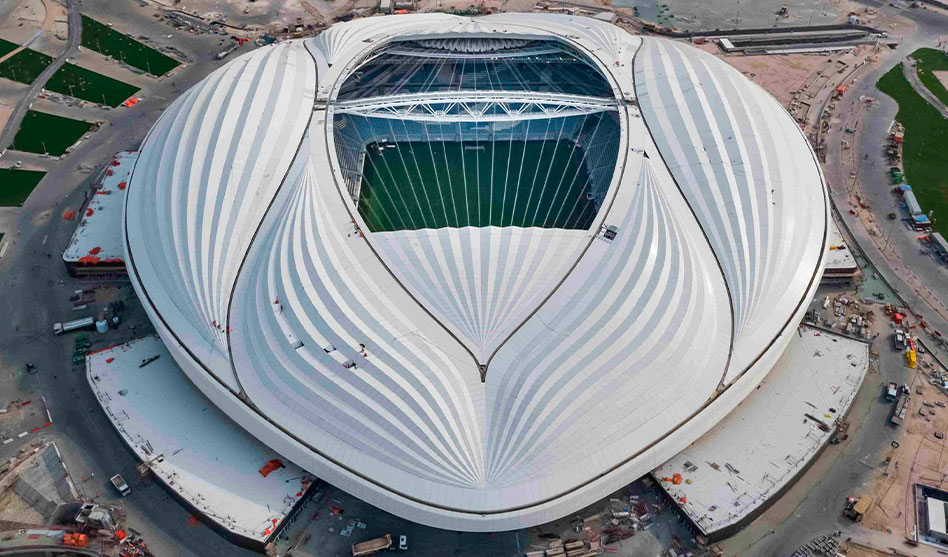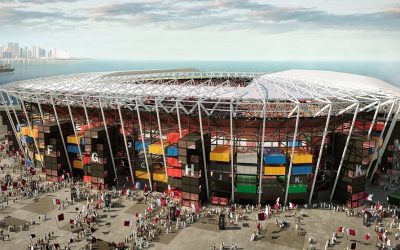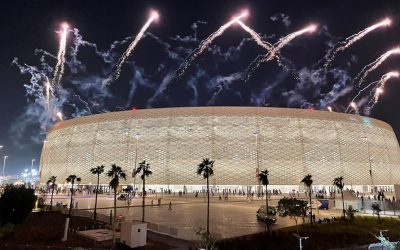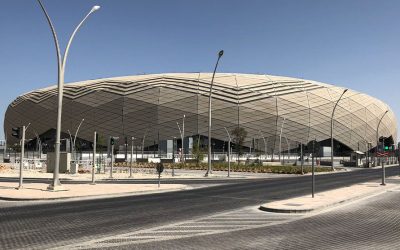One of Qatar’s oldest continuously inhabited cities, Al Wakrah, is where Al Janoub Stadium is located. Despite having a long history, this city has its eyes on the future of football. The FIFA World Cup 2022 ™ will be played out in some of the most unusual venues ever constructed for the game of soccer, with Al Janoub Stadium clearly fitting into that category.
An effective futuristic illustration of Qatar’s desire to go outside its borders.
The eye-catching design of the stadium pays homage to Al Wakrah’s history as a fishing and pearl-diving port by evoking the wind-filled sails of Qatar’s ancient dhow boats. These exquisite vessels have traveled through the Gulf of Mexico and far beyond for ages, returning filled with the richness of the sea.
After the competition, Al Janoub’s seating capacity will be reduced, and seats will be donated to other international sporting endeavors. Additionally, it will offer a lively atmosphere for Al Wakrah SC games. Beyond football, the site is surrounded by lush parks with sporting and leisure facilities that will be advantageous to the entire neighborhood for years to come. This fantastic arena has a bright future.
Al Wakrah’s maritime legacy is honored by the design, which draws inspiration from the sails of traditional dhow boats.
The stadium can be used all year round thanks to an innovative cooling system and flexible roof.
AECOM and Zaha Hadid Architects created the stadium’s architecture.
In the precinct, Al Janoub Park debuted in February 2020. It has playgrounds for kids, running and cycling trails, and other open spaces. The community will eventually have a marketplace and amenities including a mosque and a school.
The architect Zaha Hadid and her team, Zaha Hadid Architects, were responsible for designing the stadium. The stadium was constructed in tandem with a new district so that it lies at the center of an urban extension of the city, fostering community-based activities in and around the stadium on days when there are no events, according to Zaha Hadid Architects.
Its creators claim that it was influenced by the sails of historic Dhow boats that local pearl divers used to navigate the Persian Gulf currents. The exterior and roof’s curvilinear design alludes to Al Wakrah’s maritime heritage and gives visitors the impression that they are aboard a ship. The roof is supported by bowed beams that resemble a ship’s hull. The structure is designed to mimic a cluster of dhow hulls that have been turned upside down to give shade and shelter. The 230-meter-long roof arches of the stadium’s retractable roof are made of pleated PTFE fabric and wires.
The stadium’s cooling system protects users from overheating because of Qatar’s hot and dry weather. It can reduce the temperature of the spectator sections to 18°C and the playing surface to 20°C. The shape of the arena was determined by a thorough examination of the microclimate, with aerodynamics and the best shade from the roof—which has very little glass—contributing significantly to temperature regulation, according to Qatar’s Supreme Committee for Delivery & Legacy (SC).
Major Events at Al Janoub Stadium
The stadium will serve as the site of six group-stage contests and one Round of 16 contest.
22 November
Group D: France vs Australia
22:00 local time
24 November
Group G: Switzerland vs Cameroon
13:00 local time
26 November
Group F: Tunisia vs Australia
13:00 local time
28 November
Group G: Cameroon vs Serbia
13:00 local time
30 November
Group D: Australia v Denmark
18:00 local time
1 December
Group H: Ghana vs Uruguay
18:00 local time
5 November
Round of 16: 1E vs 2F
18:00 local time
Al Janoub Stadium Triva
This stadium has a great legacy even after the World Cup this year. A legacy in the sports, and also Qatari economy. After the 2022 FIFA World Cup, Al Janoub Stadium, which will host Qatar Stars League games, will replace the present Saoud bin Abdulrahman Stadium as the home of the Al-Wakrah Sports Club.
The seating capacity has been reduced from 40,000 to 20,000. The remaining seats in the stadium, according to the Qatar Supreme Committee for Delivery & Legacy, would be given to developing nations in need of sporting facilities.
Al Janoub Stadium was delivered by a number of Qatari businesses, including MIDMAC and PORR Qatar, Coastal, which made the stadium seats, and SOLB26, which produced the steel needed for the stadium. The Qatari economy has benefited from more than 50% of the stadium’s construction-related investment.
Due to the stadium’s modular design, its capacity will drop from 40,000 to 20,000 following the competition, with any extra seats from the upper deck being donated to international football development initiatives.











